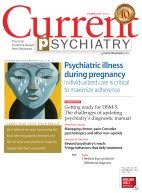 Henry A. Nasrallah, MD
Henry A. Nasrallah, MDEditor-in-Chief
Although psychiatrists commonly combine psychotropic medications, researchers malign the practice as “not evidence-based.” Research is finally catching up with clinical practice, however, and evidence is rapidly accumulating that for many patients with severe psychiatric disorders, 2 drugs are better than 1.
This should not be surprising because “real world” patients with schizophrenia, bipolar disorder, major depression, anxiety disorders, or obsessive-compulsive disorder (OCD) often do not achieve remission and are hobbled—even disabled—by their illness without combination therapy. The same principle holds true for general medical illnesses such as hypertension, cancer, or diabetes, where combination therapy is the norm rather than the exception.
Recent studies have confirmed better efficacy with combination therapy compared with monotherapy for several psychiatric illnesses.


The existence of appropriate combination pharmacotherapy is not new, but physicians still sometimes prescribe too many drugs with poor rationale and little or no evidence, and we still need a word for that. Polypharmacy has served us well and should continue to have a pejorative connotation. Let's keep it that way while recognizing that much of the time a combination works better than monotherapy.
ReplyDelete